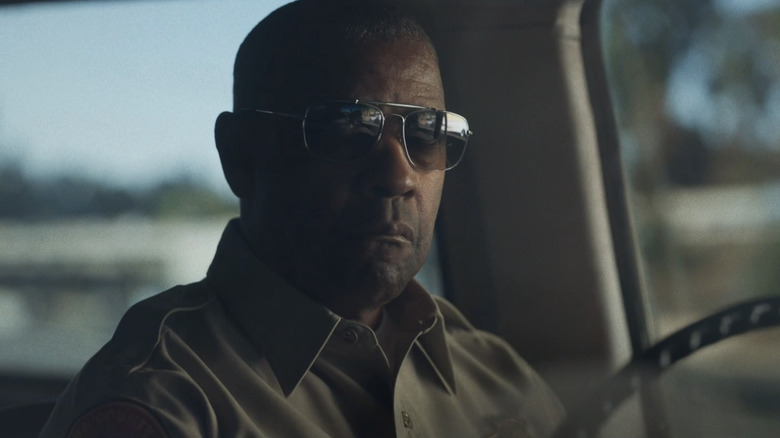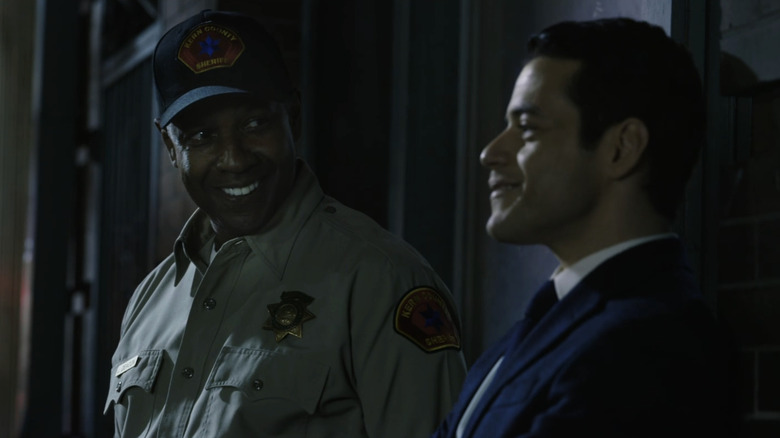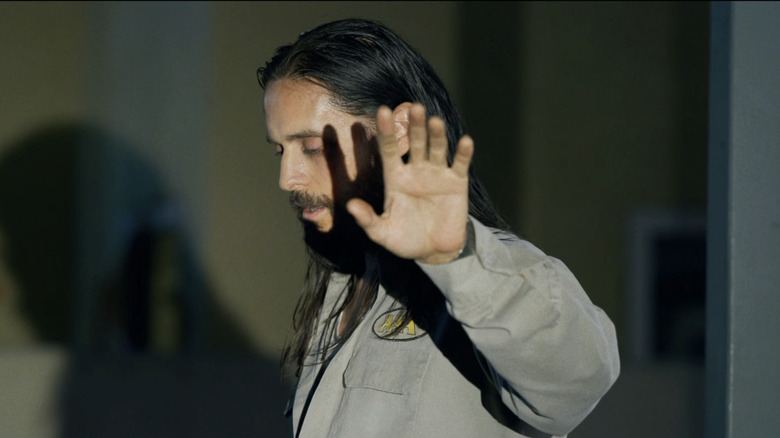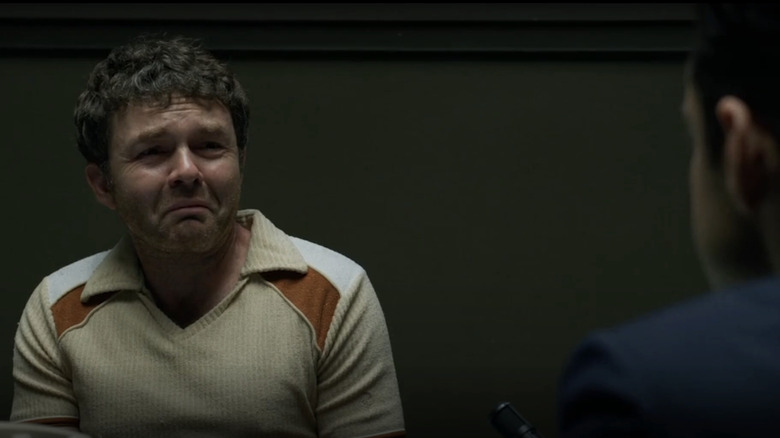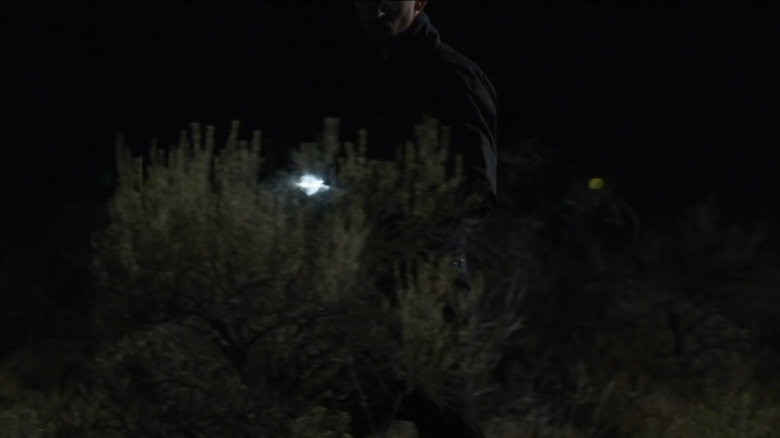Who Was The Killer In Denzel Washington's The Little Things?
2021's "The Little Things" is a fascinating little moment in cinematic history, not only because it debuted at the height of the global pandemic, but also because it was so close to being good that it almost doesn't make any sense that it wasn't. Writer/director John Lee Hancock produced a slick and stylish noir with an ending that at least tried to subvert some well-established tropes of the genre, leaving the central mystery unsolved. Denzel and his co-stars Rami Malek and Jared Leto all gave it their best, with Denzel in particular melding his undeniable charisma with a palpable sense of mournful regret. It should have been great, and yet it turned out sort of okay.
There's also the fact that this could have been the definitive Denzel crime thriller. Back in 1995, Washington almost played the role that eventually went to Brad Pitt in David Fincher's "Se7en," but passed on portraying detective David Mills after reading the script, which he deemed too "demonic." The actor has always used his faith to inform his decisions, and even wrote an ominous bible phrase on his script for 2001's "Training Day" as a way to unlock the film's themes. Still, he's always claimed to have regretted turning down "Se7en" after seeing the film, which, considering it set a precedent for modern crime thrillers, makes sense.
The star got a chance to make up for that with "The Little Things," which contained plenty of religious imagery but just fell short of giving him the neo noir he deserved. Still, there was enough about the movie to draw audiences in, not only in terms of Denzel's performance but also in that lingering mystery, which Hancock refused to conclude by the film's end. By the time "The Little Things" wraps up, we are none the wiser as to who committed the series of killings that Denzel's Joe "Deke" Deacon and Malek's James Baxter have been investigating. While the film appears to suggest that Leto's Albert Sparma is the culprit, it also provides some evidence that Sparma is innocent, making for either a frustratingly ambiguous or wonderfully mysterious procedural, depending on your sensibility.
But for those who like a touch more certainty with their disturbing crime thrillers, here's everything we know about who committed the killings in "The Little Things."
The killer is never confirmed in The Little Things
"The Little Things" is set in 1990s Los Angeles, and sees Denzel Washington play Joe Deacon, a detective with the Kern County Sheriff's Office. Having moved from LA after failing to solve the case of a serial killer who murdered several sex workers in the 1980s, Deke returns to the city after being asked to collect evidence for a case, ultimately becoming embroiled in a series of murders that bear a marked resemblance to the killings in his unsolved case.
Deke teams up with Los Angeles County Sheriff's Office detective James Baxter to try to solve the killings, believing them to be linked to his own cold case. Their investigation focuses on Albert Sparma as a prime suspect, an appliance repair store worker who is a self-professed lover of true crime. As Deke and Baxter carry out their investigation, they uncover more and more circumstantial evidence that links Sparma with the killings, but fail to find any definitive proof that he's their man, even after Deke illegally searches Sparma's apartment.
Frustrated with the way the case is playing out, Baxter takes matters into his own hands, confronting Sparma and demanding that he take him to where he hid the body of a woman named Ronda Rathbun, who went missing while jogging. Sparma takes him to a barren desert location where he tells Baxter to dig for the body, but ultimately claims to have never killed anyone. This pushes Baxter to breaking point and he hits Sparma over the head with his shovel, killing him. Meanwhile, we learn that years earlier Deke had accidentally killed a survivor of a murder case before he left LA, which was covered up by his colleagues. When Deke learns that Baxter has killed Sparma, he similarly helps cover up the killing and advises his fellow detective to forget about it.
The ending of "The Little Things" sees Baxter receive a red barrette in the mail — the same red barrette that Ronda Rathbun was wearing when she went missing. We then learn that Deke bought his own red barrette and sent it to Baxter as a way of alleviating the man's guilt over killing Sparma — as if to suggest that Deke found the barrette during his search of Sparma's apartment, pointing to him as the real killer. Deke therefore makes a strange sort of amends for his own accidental killing of an innocent survivor, taking on Baxter's own guilt for himself.
All of this makes for a unique spin on the crime procedural, but isn't the most clear-cut example of the genre. In the absence of any certainty, then, much like Deke and Baxter, we're left to go on the circumstantial evidence revealed throughout the film and make up our own minds as to who the killer was in "The Little Things"
All the evidence for Albert Sparma being the killer in The Little Things
"The Little Things" might be a predictable thriller, but predicting who the killer is proves too much for even Denzel's hardened detective. While it's never confirmed that Albert Sparma is the killer in "The Little Things," there's no shortage of evidence linking him to the various murder cases. In fact, the guy would've had a tough time defending himself in court had James Baxter not whacked him over the head with a shovel.
Firstly, there's the fact that when Deke visits Sparma at his appliance repair store, he sees a spool of brown wire that looks identical to the wire used to tie up Julie Brock (Tiffany Gonzalez), one of the modern-day victims. There's also the fact that a repairman was called to Julie's apartment before she died, and that Julie's fridge contained Busch beer — the same beer Deke finds in Sparma's apartment when he conducts his illegal search.
During that same search, Deke finds plenty of items that demonstrate Sparma's obsession with crime, including a number of books on serial killers and even a hidden compartment in the floorboards which contains a box full of newspaper cuttings about the specific killings Deke and Baxter are investigating. Sparma also has a series of VHS tapes labelled with women's names, which seems like the kind of thing Deke should have probably checked out — but we digress...
Sparma is seen delivering food to sex workers on the street, linking him to that world, and has a receiver tuned to the police radio frequency in his apartment. This either ties into his love of crime or is a way for him to keep tabs on the cops and stay aware of any potential raid on his home. The evidence continues to mount from here. During a time Sparma moved out east, the killings stopped. The repairman also visits a place where they serve roast beef sandwiches — the same meat found in the stomach of Julie Brock. Then, there's the fact he knows a lot about the killings, gets sexually aroused by the photos of the victims (just like Deke predicted earlier in the film), and while being tailed by Deke, stops right by the freeway exit near where one of the victims was found.
In all then, despite any definitive proof, that all adds up to a fairly strong case for Sparma being the killer. At least it would if the evidence against him wasn't so compelling...
All the evidence against Albert Sparma being the killer in The Little Things
"The Little Things" might not be one of the best detective movies ever made, but it does at least manage to keep you guessing all the way to the end — and beyond. Throughout "The Little Things," writer John Lee Hancock includes enough contradictory evidence to make Albert Sparma's guilt questionable. One of the most significant examples is when we learn that, eight years prior to the present-day timeline in which Deke and James Baxter are working, Sparma confessed to a murder which police ultimately discovered he couldn't possibly have committed. He therefore immediately becomes an unreliable narrator, throwing into doubt his involvement in the killings being investigated by Deke and Baxter and reinforcing the idea that Sparma just loves the attention.
Elsewhere, the fingerprint recovered by police at one of the crime scenes is close to Sparma's own, but not an exact match. What's more, neither Deke nor Baxter ever recover the murder weapon used by the killer, even though they search Sparma's house and car.
But by far the most compelling evidence for Sparma being innocent, or at least not the killer himself, is the opening sequence of the film, during which a woman, Tina Salvatore (Sofia Vassilieva), is stalked on the freeway by someone in a blue car. Not only is Sparma never seen driving a blue car, but this opening scene also reveals a quick glimpse of the stalker, who looks to be taller than Sparma and has a goatee. In order for him and Sparma to be the same man, the latter would have had to have grown his long hair and beard in the space of a few days. Finally, this mystery stalker's walk is unlike Sparma's, who is shown limping throughout the film.
All of this at least throws doubt on the idea that Sparma is the real killer, even if it doesn't entirely exonerate him.
Were there any other suspects in The Little Things?
"The Little Things," which had a brief renaissance when it topped the Netflix charts in 2024, primarily focuses on Deke and James Baxter's investigation into Albert Sparma. As such, there aren't any other major suspects in the case. That said, early in the film, Baxter apprehends a suspect by the name of Stan Peters (Frederick Koehler), and Deke comes into the station to watch the interrogation. Peters is a registered sex offender who becomes incredibly uncomfortable after he sees pictures and hears the names of some of the victims, especially Mary Roberts — the girl who Deke accidentally killed before he left LA.
Later, we find out that Peters ended his own life off-screen, but we never learn much more about his possible involvement in the case. Could he have been the real killer? That remains a possibility, but it's far more likely that Peters, having been registered as a sex offender, was so upset by the prospect of having murders pinned on him that it led to him dying by suicide. The fact that he became visibly disturbed by the name Mary Roberts suggests that his breakdown was not as a result of having killed anyone — Roberts was alive before Deke shot her, which means Peters knows unequivocally that he did not kill her — but that he was overwhelmed at the prospect of being convicted of these killings.
Again, there's never any confirmation as to whether Peters was involved or not. Could he have had some knowledge of the killings? Perhaps. Was he even an accomplice? Possibly. But much like everything else in "The Little Things," Peters actual connection to the killings remains a mystery.
The accomplice theory
While there is no official explanation as to who the killer is in "The Little Things," that hasn't stopped fans from theorizing. Most debates revolve around whether Albert Sparma is or is not the killer, but one intriguing theory casts him as an accomplice.
Over on Reddit, a user has suggested the actual killer was a fellow employee of Sparma's at the appliance repair store. What makes this particular theory so intriguing is that there are definite similarities between the stalker glimpsed briefly during the opening sequence and the employee in question — as revealed in this side-by-side comparison. It should be said that this is far from proof. Firstly, the stalker wears glasses and the appliance store worker is not shown wearing any. But the physical appearance and goatee do look very similar. Regardless of whether this is the killer or not, it opens up the possibility of there being two murderers involved, with Jared Leto's character coming in after the initial killings are carried out to have his perverse way with the bodies, as detailed during the autopsy of Julie Brock.
Other Redditors have latched onto that theory, too, with one writing about the opening sequence: "There are at least 2 'killers,' the guy with the flashlight and the big rig driver." Indeed, there is a big rig during the beginning of the film when Tina Salvatore tries to escape her stalker. We never see who's inside but it could be that this was an accomplice, and when you consider that Leto's character became aroused when looking at crime scene photos, it might make sense that he only comes in after the murders have been committed to do whatever it is he does. Washington passed on "Se7en" because he found the script to be "demonic," but if this explanation of "The Little Things" turns out to be accurate, John Lee Hancock's film isn't much better. Once again, however, none of this is ever confirmed, leaving us to forever ponder what really happened, much like Denzel's tortured cop himself.
